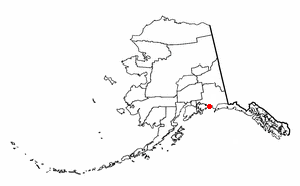Cordova, Alaska
|
|
Cordova is a small town located near the mouth of the Copper River in Alaska, at the head of Orca Inlet on the east side of Prince William Sound.
| Contents |
Geography
Cordova is located within the Chugach National Forest at 60°32'21" North, 145°42'8" West (60.539206, -145.702230)Template:GR.
According to the United States Census Bureau, the city has a total area of 195.9 km² (75.6 mi²). 158.9 km² (61.4 mi²) of it is land and 37.0 km² (14.3 mi²) of it is water. The total area is 18.87% water.
Demographics
Based on the 2000 censusTemplate:GR for the Valdez-Cordova area, the city has 2454 people, organized into 958 households and 597 families. Like a number of locations in the state, the city is predominately male: for every 100 females there are 119½ males, and for every 100 females age 18 and over, there are 120.4 males.
The population density is 15.4/km² (40.0/mi²). There are 1,099 housing units at an average density of 6.9/km² (17.9/mi²). The racial makeup of the city is 71.11% White, 10.35% Native American, 10.07% Asian, 0.41% Black or African American, 1.34% from other races, and 6.72% from two or more races. 3.06% of the population are Hispanic or Latino of any race.
There are 958 households out of which 36.1% have children under the age of 18 living with them, 49.5% are married couples living together, 8.1% have a female householder with no husband present, and 37.6% are non-families. 30.3% of all households are made up of individuals and 5.4% have someone living alone who is 65 years of age or older. The average household size is 2.48 and the average family size is 3.17.
In the city the population is spread out with 28.0% under the age of 18, 7.1% from 18 to 24, 32.8% from 25 to 44, 25.4% from 45 to 64, and 6.8% who are 65 years of age or older. The median age is 37 years.
The median income for a household in the city is $50,114, and the median income for a family is $65,625. Males have a median income of $40,444 versus $26,985 for females. The per capita income for the city is $25,256. 7.5% of the population and 4.3% of families are below the poverty line. Out of the total population, 8.2% of those under the age of 18 and 6.2% of those 65 and older are living below the poverty line.
History
The area around Cordova was historically been the home to Alutiiq, with some visits from migrating Athabascan Eyak. Orca Inlet was named "Puerto Córdova", after the city of Cordoba, Spain, by Don Salvador Fidalgo in 1790.
The town now called Cordova was founded by prospectors in 1884.
One of the first oil fields in Alaska was discovered in 1902 at Katalla, 76 km (47 miles) southeast of Cordova. The town of Cordova was named in 1906 by Michael Heney, builder of the Copper River and Northwestern Railway, after the inlet. Cordova became the railroad terminus and port for copper ore from the mines at Kennicott up the Copper River. The first trainload of ore was loaded onto the steamship Northwestern, and taken to a smelter in Tacoma, Washington, in April 1911. The copper mines operated until 1938 and yielded over $200 million in copper, silver and gold. The Katalla oil field produced until 1933, when it was destroyed by fire.
The economy of Cordova now relies on fishing and canning (particularly of chinook and sockeye salmon), as well as logging and tourism. Cordova has a large fishing fleet that operates in Prince William Sound as well as several fish processing plants.
Cordova is accessible by plane or boat. It is linked directly to the Pacific Ocean shipping lanes through the Gulf of Alaska. It receives year-round barge services, and Alaska Marine Highway ferries serve Cordova in the summer.

